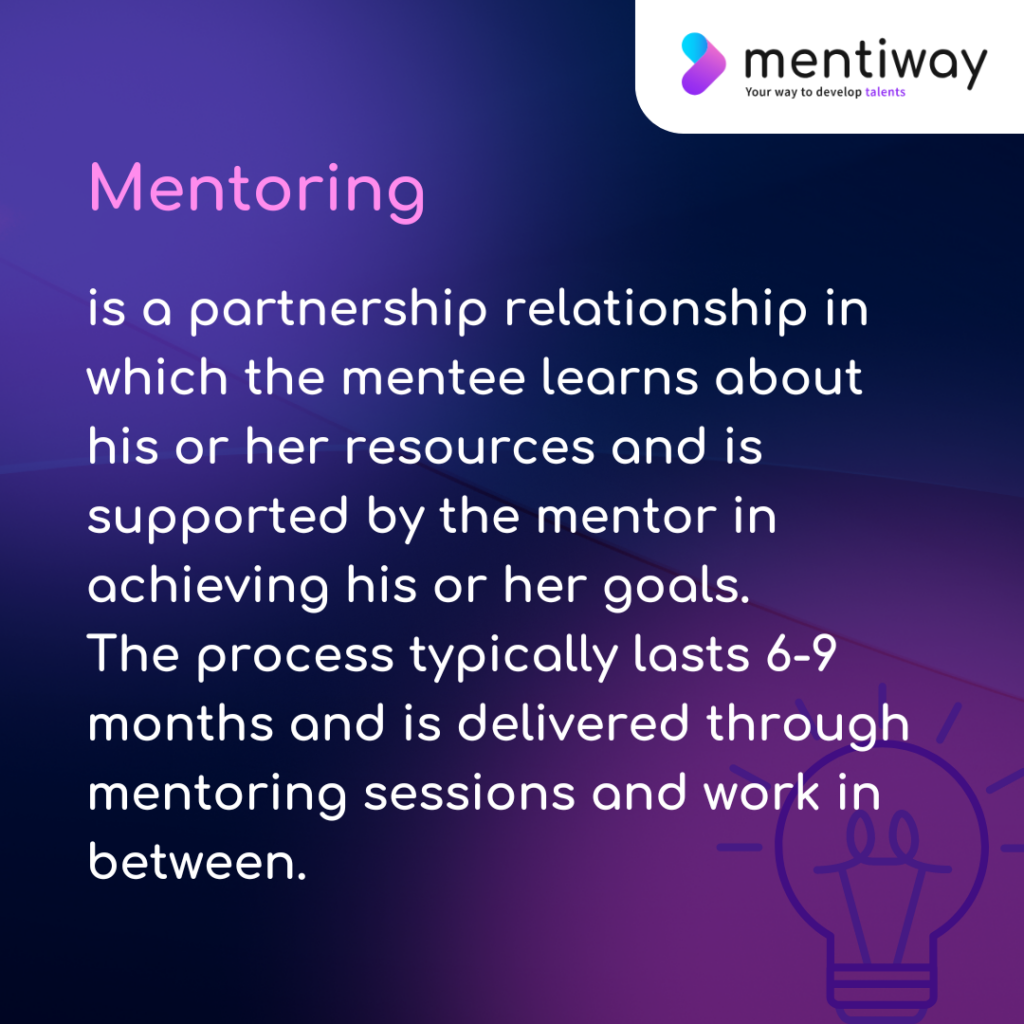Mentoring FAQ. Questions and answers about mentoring programs
Mentoring is a process that has long played a key role in the professional and personal development of many people around the world. Although mentoring can take many forms and be used in a variety of contexts, many people still have many questions about what exactly mentoring is and what benefits it can bring.
In this article, we will try to dispel any doubts and answer the most common questions about mentoring. Whether you are an individual looking for a Mentor or considering a Mentor role for others, our list of questions and answers (FAQs) will give you a better understanding of what mentoring is all about and how it can be used in various aspects of life.
Next to each answer, we have also included links to other articles on our blog that describe the issue in more detail.

What is mentoring?
This is a long-term development process in which the relationship between Mentor and Mentee plays a central role. The Mentor is a person with more experience in the chosen field, who helps the Mentee define a developmental goal, shows the way to achieve this goal, and gradually, from session to session, leads the Mentee towards achieving the set goals.
See also definition of mentoring.
What do I gain as a Mentee?
The opportunity to grow, learn and experiment in the very safe environment that a mentoring relationship provides. It is a process that, with the involvement of both parties, carries both personal and professional value.
See also more benefits of being a Mentee.
What do I gain as a Mentor?
The great advantage of mentoring is that the process benefits not only the learner – Mentee, but also the Mentor . Thanks to the active conduct of the session, you can develop your existing skills, gather new experience and also test in practice the techniques of development talks useful, for example, in the work of a manager.
See also more benefits of being a Mentor.
Do I have to be in a management position to become a Mentor?
No, fulfilling a mentoring role is not related to your position in the organization. What is crucial in the mentoring process is your knowledge, competence and skills that you are willing and able to share.
See also who is a Mentor.
What does it take to become a Mentor?
Experience, time, commitment, knowledge of the process, interest in the other person, and willingness to help Mentee grow.
See also definition of Mentor and required qualities and competencies.
What are the tasks of a Mentor?
The Mentor primarily accompanies, supports and listens to the Mentee while analyzing and drawing conclusions. He also helps the Mentee build self-awareness and problem-solving by asking relevant questions. Ultimately, he or she also shares his or her own knowledge and experiences related to the issue at hand. A mentor should not give advice or point to a specific path.
See also who is a Mentor.
See also a separate article on what a Mentee can expect from a Mentor.
Is mentoring something like giving advice and guidance?
No, mentoring is a formalized process with a specific structure in which we work on a given Mentee goal(s). The mentoring process consists of listening, asking questions, answering questions and only about 5% self-suggestion.
Also check out definition of mentoring – what mentoring is in practice.
What if I don’t prove myself as a Mentor?
If such a thought occurs to you, then in all likelihood your inner critic – your greatest saboteur – has been triggered. If you don’t try, you’ll never know if you’ll prove yourself in this role. Using Mentiway, we will guide you through the process step by step, as well as equip you with the necessary knowledge to succeed in this role and derive satisfaction.
As a manager of a person, can I also be a Mentor for him/her?
We do not recommend this solution. The support we get from the boss(es) has a direct impact on his (her) success, achieving goals, receiving a bonus or promotion.
In mentoring, such a relationship should not exist. The mentor benefits from the process in a different way.
Can I be a Mentor and a Mentee at the same time?
Yes, appearing in one mentoring program in both roles is technically possible, but it is not a common or recommended practice. Participating in the program in one role already requires a certain commitment. With two, it will be significantly greater. In addition, staying with one role allows for greater focus on the process at hand and increases its effectiveness.
How to define your goal in mentoring?
Very often the overarching goal is set at a high level by the organization itself. This provides a starting point for defining the Mentee’s goals for the mentoring process taking into account both the Mentee’s individual needs and the needs of the organization.
The goal-setting process itself is supported by the Mentor , who will have the tools to do so. In addition, the Mentiway application will have materials for both the Mentor and Mentee that will be useful in goal setting.
See also the article on goal setting in mentoring.
What do mentoring sessions consist of?
In mentoring sessions, goals or topics brought by the Mentee are discussed. During the meeting, the Mentor listens, asks questions, sometimes shares his or her own ideas but also gives space to practice, experiment and even make mistakes. It’s a process that uses a range of techniques and tools to best achieve the Mentee’s goal.
See also what a mentoring session looks like and what to keep in mind when scheduling pair meetings.
How much time do I have to spend on mentoring?
Mentoring has a broader dimension than just time. It’s also a commitment for which we can’t find a simple measure. This goes for both Mentors and Mentees. The mentoring meetings themselves usually last about one hour (the exact duration of the meetings will be determined during the first session) and take place no less than once a month. The process will also require activities between meetings in the form of homework, preparation for meetings and also reflection for personal and professional development.
Is my involvement required between sessions?
The degree of involvement in the whole process will translate into the obtained. Mentoring assumes that between sessions there may be (but does not have to be!) to do “homework” which is each time a subject discussed during the session.
What happens after the program ends?
At the end of the program, both Mentor and Mentee will receive a certificate confirming their participation in the mentoring process. Additionally, the assumption of the process is that during the last sessions the Mentee’s further development plan is discussed. It is also possible to continue the process with the same or another Mentor if all interested parties wish to do so.
What if in the process I decide that Mentor is not for me?
During the process, at each stage, there will be an opportunity to contact the person coordinating the entire program. It will be important to share your reflection on the Mentor’s mismatch. Importantly, this will take place without any consequences. Sometimes it is only after some time that we feel that a particular relationship does not serve us. Depending on what the possibilities are at the moment, we will try to select another Mentor or invite you to the next edition of the process.
What is the difference between mentoring and coaching?
There are more similarities than differences between these working methods. Mentoring uses techniques and tools used in coaching conversations as well. What certainly makes a difference is that the Coach does not need to “know” the area in which he or she will support the coachee. The Mentor, on the other hand, should definitely have significantly more knowledge and experience than the Mentee in the topic in which the Mentee wants to develop.
Also check out a more extensive article on the differences between mentoring and coaching and other forms of development.
What will my/my manager learn about my process?
The content of the session should be confidential, which is also part of the contract between Mentee and Mentor.
The manager may have insight into the process, e.g. in terms of goals or the final report, which is also agreed at the very beginning of the process with the Mentee.
For our part, we encourage that outgoing information about the process comes out of the Mentee and not the Mentor.
Are mentoring sessions confidential?
Yes the content of the session should be confidential, which is also part of the contract between Mentee and Mentor.
The employer may have insight into the process, e.g. in terms of goals or the final report, which is also agreed at the very beginning of the process with the Mentee.
For our part, we encourage that outgoing information about the process comes out of the Mentee and not the Mentor.
How to define your development goal?
Very often the overarching goal is set at a high level by the organization itself. This provides a starting point for defining the Mentee’s goals for the mentoring process taking into account both the Mentee’s individual needs and the needs of the organization.
The goal-setting process itself is supported by the Mentor , who will have the tools to do so. In addition, the Mentiway application will have materials for both the Mentor and Mentee that will be useful in goal setting.
See also the article on goal setting in mentoring.
How long does mentoring last?
The duration of the mentoring processes depends on the arrangement between Mentor and Mentee. Usually it is several months (6-9), during which there are 6-10 hourly or hour-and-a-half meetings.
See also more extensive text on the duration of the mentoring process.
How often should you meet with your Mentor?
The frequency of meetings depends on the needs and arrangements between the Mentor and Mentee. These can be shorter meetings once every two weeks or longer meetings once a month, or as otherwise agreed.
Is mentoring only for people at the beginning of their careers?
No, mentoring can be beneficial at any stage of a career. Both entry-level and experienced employees can benefit from a mentoring relationship.
There is even the concept of reverse mentoring, in which a younger person with theoretically less experience is the Mentor for older people who want to learn more about new technologies and how the younger generation thinks.
Is mentoring limited to the professional sphere only?
No, mentoring can be about different aspects of life, including personal development, education, or even family life.
How can you evaluate the effectiveness of mentoring?
The effectiveness of mentoring can be assessed primarily by the achievement of the set goals. If the goals have been defined according to the SMART technique, for example, then each goal has a zero-one criterion for achievement and it is easy to determine whether it has been achieved.
See also more on SMART techniques.
We have also prepared a separate article for organizers of mentoring programs on measuring the effectiveness of mentoring.
Can mentoring be used in education?
Yes, mentoring is often used in education, especially in academic programs and professional training.
See more on mentoring at universities in Europe.
How to find a mentoring program for yourself?
First of all, we suggest you check whether the organization you belong to (university, company, industry organization) has mentoring programs. If not, you can always suggest organizing such a program, or at least a pilot.
An alternative is to look for open mentoring programs on the web. With help here comes a search engine or our directory of mentoring programs.
Hi, my name is Thomas. I am the Co-Founder of Mentiway. We are happy to share our knowledge and support organisations on their way to success! 💪 If you are interested in how to efficiently and effectively implement a mentoring programme in your organisation using technology:








